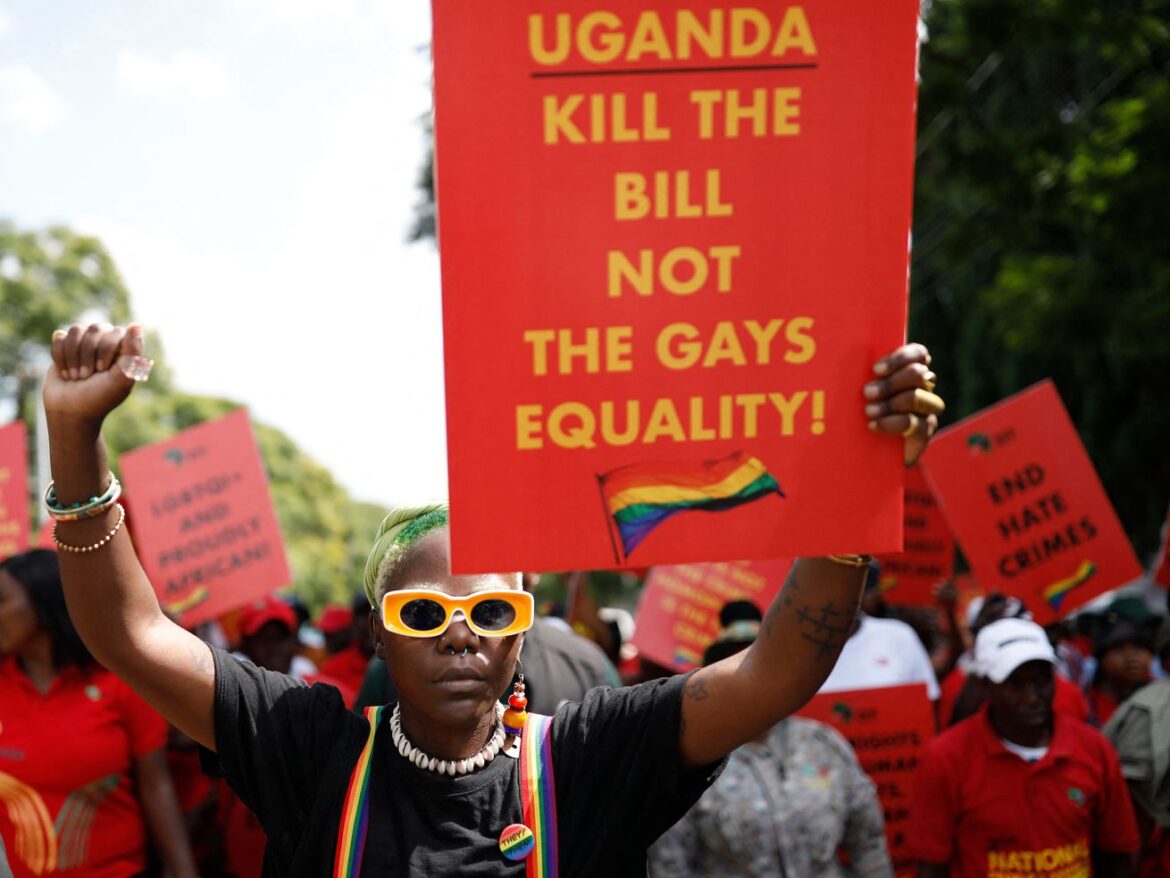A version of Uganda’s “kill the gays” bill will likely become law, after years of campaigning.
Ugandan President Yoweri Museveni has upheld the “strong stand” the Ugandan parliament took in anti-LGBTQ legislation passed last month, which mandates the death penalty for some acts. Though Museveni failed to sign the legislation, that doesn’t mean LGBTQ Ugandans are safe; he’ll likely sign the bill with provisions for “rehabilitation.”
Uganda is one of several African nations where it is illegal to be queer; the nation enacted its Anti-Homosexuality Act in 2014, which allowed for life imprisonment for some homosexual acts between consenting adults, and codified the repression of LGBTQ Ugandans. That legislation was annulled in court in 2014, though homosexuality was still illegal per previous law, according to a Human Rights Watch report.
The latest bill takes Uganda’s anti-LGBTQ policies much further, punishing LGBTQ advocacy with up to 20 years in prison and proposing the death penalty for “aggravated homosexuality” — homosexual acts involving children or members of other at-risk groups, or involving a person who is HIV positive. A person convicted of “attempted aggravated homosexuality” can be imprisoned for up to 14 years, and “attempted homosexuality” could land a person a 10-year prison sentence.
Anti-LGBTQ rhetoric and policy is nothing new in Uganda or other former British colonies. The British Empire imposed its colonial penal code, including the anti-sodomy law Section 377 on the territories it had claimed. Since former African colonies gained independence in the 1960s, few have repealed the colonial anti-sodomy laws, instead enacting harsh policies including life in prison.
Museveni indicated he “had no objections to the punishments” included in the law, his spokesperson Sandor Walusimbi said in an April 20 tweet, “but on the issue of rehabilitation of the persons who have in the past been engaged in homosexuality but would like to live normal lives again.” If and when the bill is signed into law, Uganda will be the fourth African nation in which homosexuality is punishable by death, according to a Reuters report.
Rhetoric and advocacy around the bill has already forced LGBTQ people to flee the country, fearing for their lives. Mbajjwe Nimiro Wilson, a 24-year-old gay man, fled the capitol Kamapala after a crowd of people threatened him as he bought groceries. “They kept saying, ‘We will hunt you. You gays should be killed. We will slaughter you,’” he told the New York Times this week. “There was no option but to leave.”
Uganda has a history of anti-LGBTQ laws and public sentiment
Uganda was already hostile to LGBTQ people, even before the 2014 Anti-Homosexuality Act; colonial influence was baked into the penal code, and a 2009 bill colloquially called the “kill the gays” bill sparked international outrage for a provision that would allow gay people to be hanged. The bill also required citizens to spy on their neighbors, friends, and family members and report those they suspected of being LGBTQ or advocating for gay rights or face a three-year prison sentence, according to a Human Rights Watch report at the time.
That bill, along with the 2014 legislation — which Museveni signed into law — eventually became the bill that parliament is adjusting to the president’s orders.
Ugandan society had already been mobilized against LGBTQ people at least since the 2009 bill; according to Human Rights Awareness and Promotion Forum, a Ugandan LGBTQ rights group, there were 23 arrests of LGBTQ people between 2007 and 2011. Immediately after the passage of the 2014 bill, 17 people were arrested, according to Human Rights Watch. If past is prologue, LGBTQ Ugandans could be denied housing and healthcare, among other potential dangers.
Most members of Uganda’s parliament voted for the 2023 bill — 387 of the 389 present, according to the Associated Press. Recent events including the Church of England’s decision to bless same-sex marriages and allegations of sexual abuse at boarding schools in the country have inflamed anti-LGBTQ sentiment in the country.
The government shut down Sexual Minorities Uganda (SMUG), a high-profile group for LGBTQ causes in the country, last year, claiming that it had failed to properly register as an NGO. Nigerian journalist Caleb Okereke, writing in Foreign Policy in March, also described a social media campaign against SMUG claiming that the organization lured young people into becoming LGBTQ.
The 2023 legislation has attracted widespread international condemnation; US Secretary of State Antony Blinken tweeted last month that the legislation “would undermine fundamental human rights of all Ugandans and could reverse gains in the fight against HIV/AIDS.”
Agnès Callamard, the secretary general of Amnesty International, called upon Museveni to reverse the law. “The passing of this appalling bill is a heart-breaking moment for the LGBTI community and their loved ones in Uganda,” she said in a statement. “President Museveni must urgently pay heed to the community’s outcry against this Bill and urgently veto it. Nobody should ever be criminalized for their sexual orientation or gender identity.”
The 2023 bill also applies to trans and gender nonconforming people, punishing with up to 10 years in prison anyone who “holds out as a lesbian, gay, transgender, a queer, or any other sexual or gender identity that is contrary to the binary categories of male and female.”
Museveni meanwhile paints the country’s anti-LGBTQ policies as anti-imperialist, telling a meeting of lawmakers on Thursday, “Europe is lost. So they also want us to be lost,” according to footage released on UBC, a Ugandan broadcast network. “It is good that you rejected the pressure from the imperialists. And this is what I told them. Whenever they come to me I say, ‘You, please shut up.’”
American evangelical groups have played a role in pushing hateful policies
In reality, the US in particular has influenced or supported anti-LGBTQ policies and attitudes in Uganda, particularly via evangelical groups like the Fellowship Foundation, which had a hand in crafting the 2009 “kill the gays” bill, according to a 2020 report from Open Democracy.
In 2012, SMUG sued American evangelist Scott Lively in a US court for his role in promoting the anti-LGBTQ agenda that influenced the “kill the gays” bill and led to the persecution of LGBTQ people in Uganda. Though the court eventually dismissed the case, ruling that it could not be tried in the US because the alleged crimes took place elsewhere, the presiding judge, Michael Ponsor, affirmed that Lively contributed to “a vicious and frightening campaign of repression against LGBTI people in Uganda.”
US evangelical groups are also instrumental in pushing an “ex-gay” narrative in Uganda — contributing to the idea of “rehabilitation” that Museveni aims to write into the 2023 bill.
Okereke described the grip that the ex-gay narrative has taken in Uganda and elsewhere in Africa. “The prodigal son parable has propped up the ex-gay movement in Uganda, ensuring there are open arms to gay people who can speak about previously being in that life of ‘sin’ and denounce their gayness publicly,” Okereke wrote. “It seems that as the ex-gay movement lost its grip in the United States, it started to reach for relevance elsewhere.”
The evangelical Christian group Family Watch International held an event on “family values and sovereignty” in Entebbe in March, the Guardian’s Alice McCool reported at the time. Family Watch International is listed as an anti-LGBTQ hate group by the Southern Poverty Law Center and supports so-called “conversion therapy” for LGBTQ people.
At the event, Museveni called on Africa to “provide the lead to save the world from this degeneration and decadence, which is really very dangerous for humanity. If people of opposite sex [sic] stop appreciating one another then how will the human race be propagated?”
Other African nations, including Kenya, Zambia, and Ghana, have begun to pass similarly draconian legislation, and legislators from more than a dozen other African nations attended the Entebbe conference, pledging to advocate for anti-LGBTQ policies in their own countries, the New York Times reported earlier this month.
“The wave of homophobia and transphobia in Uganda, and the region, has nothing to do with Ugandan or African values,” Ugandan human rights activist and lawyer Nicolas Opiyo told the Guardian. “It is a disguised campaign by American evangelicals through their local actors. Their campaigns have now been organized under what appears to be local professional entities such as Christian lawyers’ groups, parliamentary forums and so forth.”
Despite the hostile rhetoric, draconian policy, and repression, LGBTQ rights activists and their allies — including members of Parliament — have vowed to fight the discriminatory policies in Uganda and the region. Fox Odoi-Oywelowo, one of two legislators who voted against the bill and a former senior counsel to Museveni told the Times that he will join a legal challenge to the bill if and when it becomes law.
“If the state chooses for a human being who to fall in love with,” Odoi-Oywelowo told the Times, “that would be the greatest abrogation of our most basic rights.”



